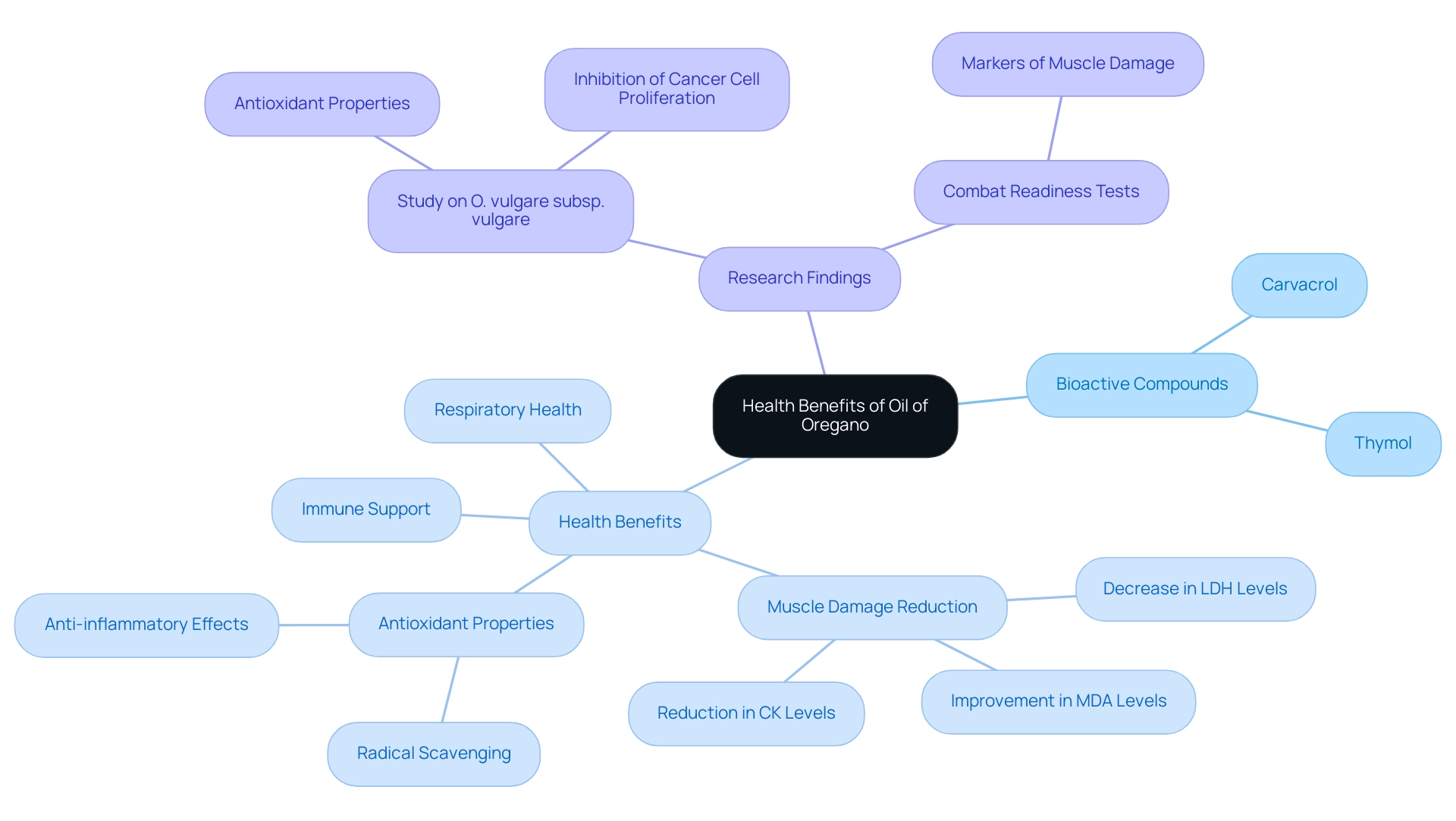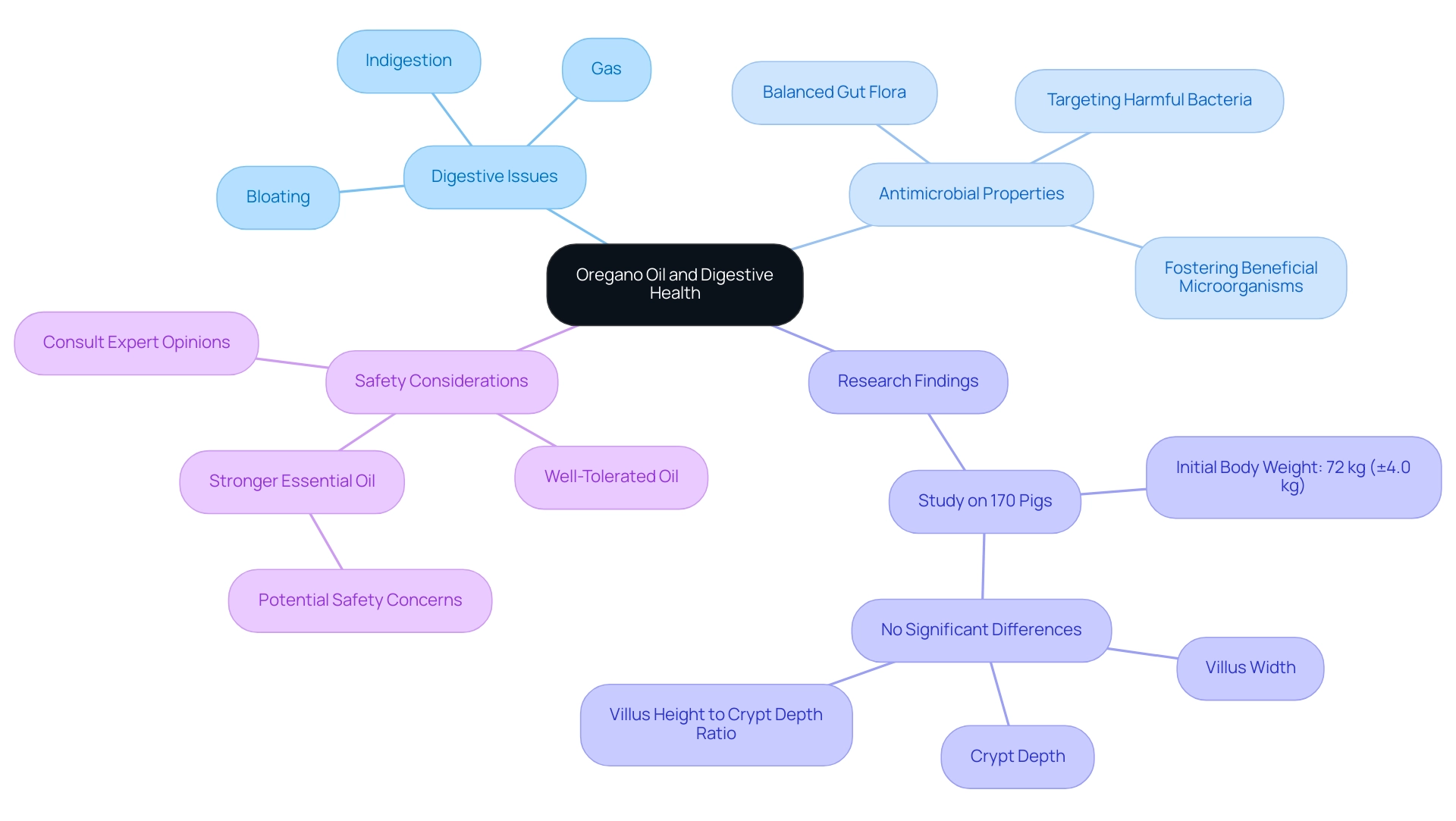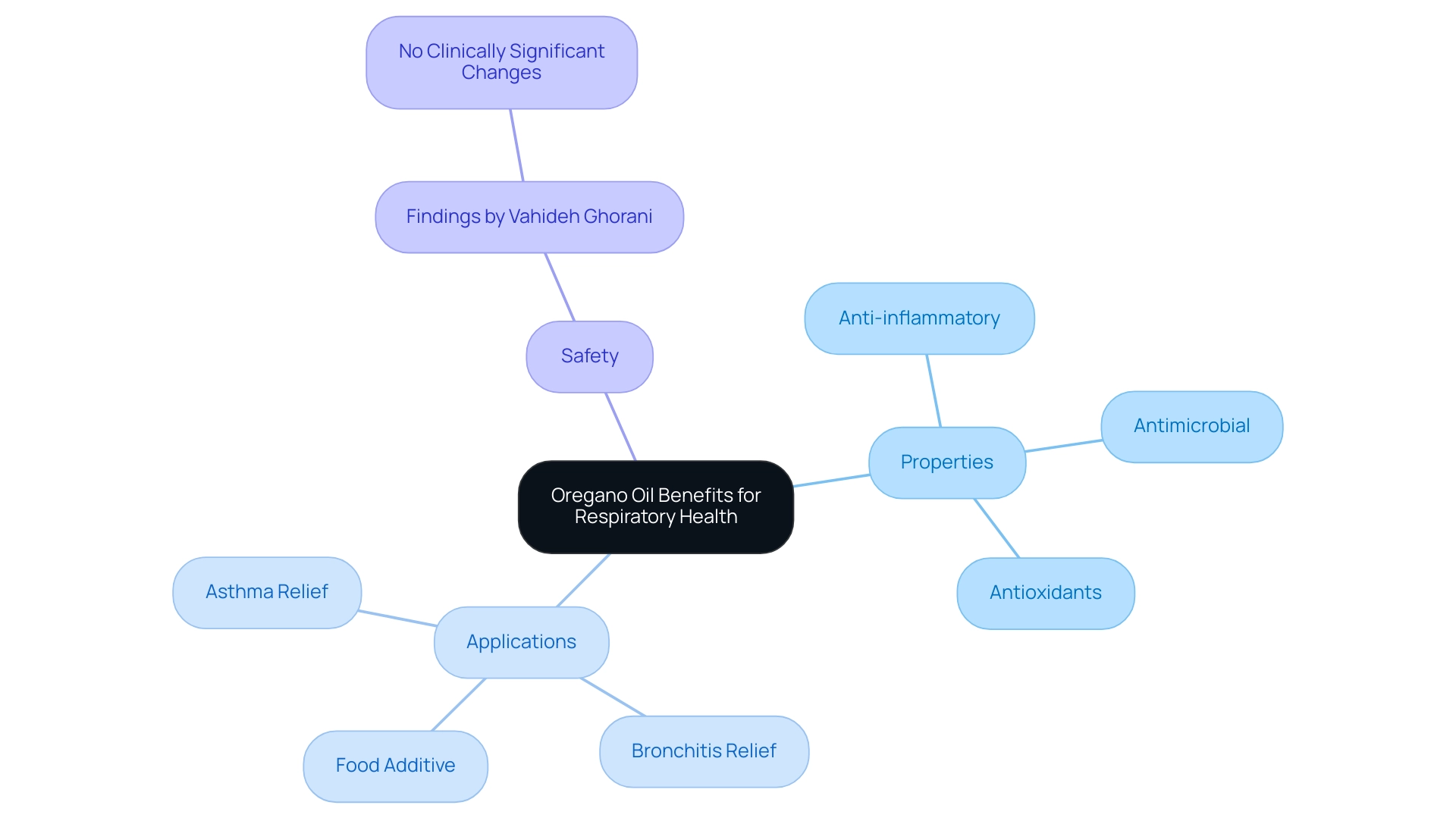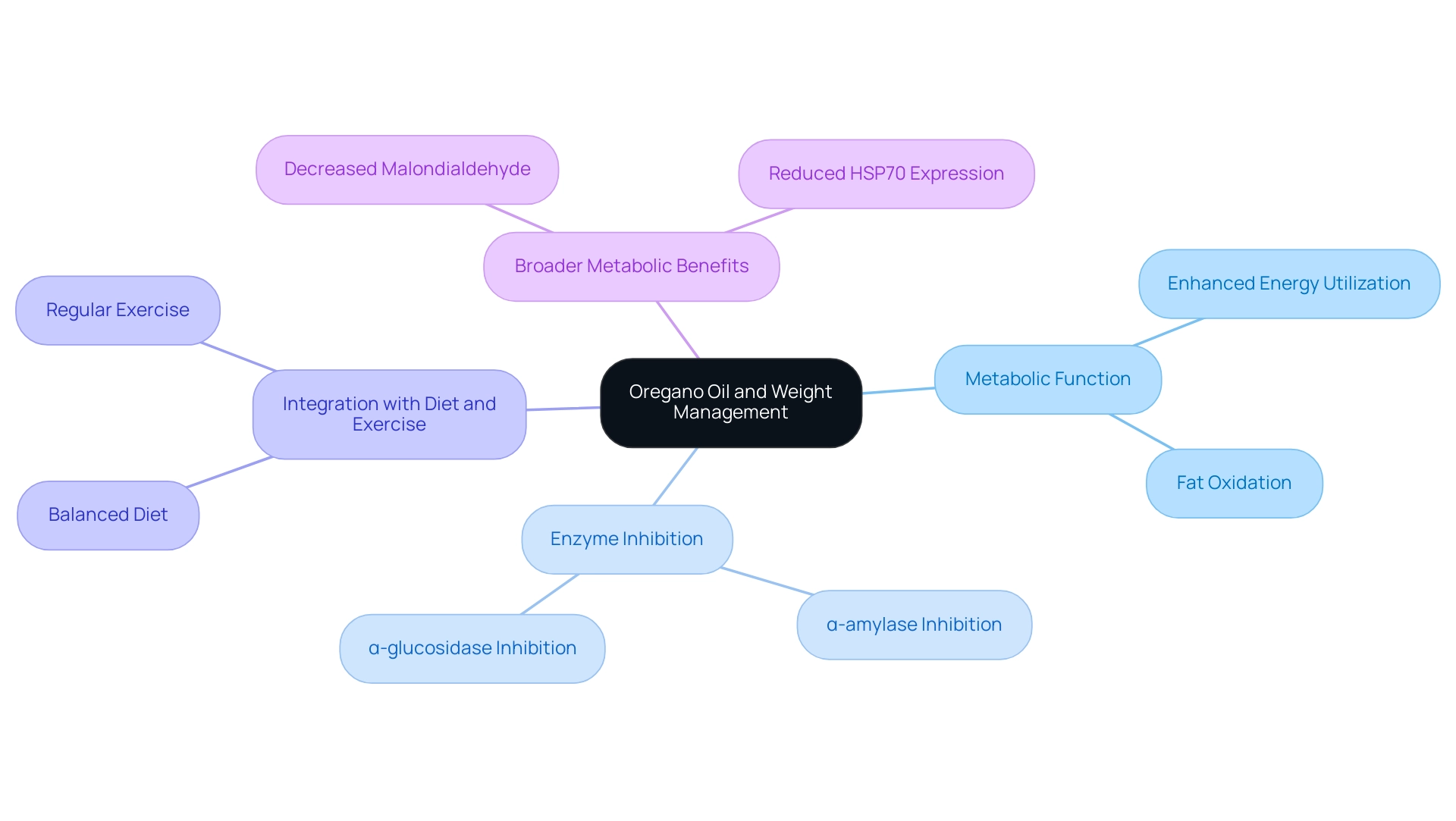Introduction
The health benefits of oil of oregano have garnered significant attention in recent years, positioning it as a valuable addition to wellness routines. Extracted from the oregano plant, this essential oil is packed with bioactive compounds such as carvacrol and thymol, renowned for their therapeutic properties. From enhancing immune function to combating infections, oregano oil demonstrates a multifaceted approach to health. Research highlights its potential in:
- Reducing inflammation
- Supporting digestive health
- Promoting respiratory wellness
As the demand for natural remedies increases, understanding the breadth of oregano oil's benefits becomes crucial for those seeking alternatives to conventional treatments. This article delves into the various health advantages of oil of oregano, exploring its efficacy and safety, and guiding readers on how to incorporate it into their daily lives.
1. Exploring the Health Benefits of Oil of Oregano
Oil of oregano is a herb, extracted from the leaves of the plant (O. vulgare subsp. vulgare), is celebrated for its extensive health benefits. This essential oil is rich in bioactive compounds, primarily carvacrol and thymol, which are known for their potent therapeutic properties.
Recent research has highlighted that
oregano supplementation can significantly improve markers of muscle damage, with reported reductions in MDA, CK, and LDH levels, as well as enhancements in total antioxidant capacity, particularly after physical stress like combat readiness tests. For instance, a study involving O. vulgare subsp. Vulgare demonstrated its antioxidant properties through radical scavenging and anti-inflammatory effects by reducing inflammatory cytokines and inhibiting cancer cell proliferation.
Furthermore, research has established its efficacy in supporting immune function and improving respiratory health, showcasing its potential to alleviate various ailments. As Jon Johnson observes, 'The therapeutic properties of oil from the herb make it a powerful ally in natural wellness.' With its multifaceted benefits, oil from the herb serves as an invaluable addition to wellness regimens for those seeking natural alternatives to conventional medical treatments.
2. Antimicrobial Properties: Fighting Infections with Oregano Oil
Extensive research underscores the remarkable antibacterial and antifungal properties of oil derived from the herb, primarily attributed to its active compound, carvacrol. This compound has been scientifically validated for its ability to inhibit the growth of harmful bacteria such as E. coli and Salmonella, making it a formidable contender in the fight against foodborne illnesses. In fact, studies indicate that oil from a specific herb can reduce the growth of E. coli by up to 99% in certain concentrations.
Furthermore, oil of oregano from the herb has demonstrated efficacy in combating fungal infections, including Candida, highlighting its versatility as a health supplement. In the context of rising antibiotic resistance, oil of oregano offers a promising alternative for treating infections. Hristo M. Najdenski noted the 'Improvement of the Antimicrobial Activity of Oil of Oregano by Encapsulation in Chitosan—Alginate Nanoparticles,' which suggests enhanced effectiveness through advanced formulations.
Recent in vivo research shows that both oil of oregano and its nanoparticle formulation are
safe for topical use, as they did not cause skin irritation in test subjects. Additionally, a case study on the morphology of photographic gelatin with essential oils revealed that while higher concentrations may lead to structural inhomogeneities, lower concentrations maintained suitable properties, suggesting that careful formulation is key to maximizing the benefits of this oil. This reinforces the oil's potential as an effective and safe remedy in our health arsenal.
3. Harnessing Antioxidants: How Oregano Oil Protects Your Health
Oil of oregano serves as a potent source of antioxidants that play a crucial role in neutralizing free radicals within the body. Free radicals are unstable molecules that can lead to oxidative stress, a condition linked to the development of chronic diseases such as heart disease and cancer. By adding oil of oregano into your diet, you may strengthen your body's defenses against oxidative damage.
Recent studies indicate that the total content of fatty acids in stem extracts exceeds 70%, highlighting their nutritional value. Furthermore, research findings suggest that antioxidant activities in essential oils, including those obtained from a certain herb, have been evaluated through a series of dilutions in a
reducing power assay. This evaluation illustrates the ability of a specific oil to effectively lower oxidative stress, highlighting its possible wellness advantages.
Dragan Cvetkovic notes,
The Yield, Chemical Composition, and Antioxidant Activities of Essential Oils from Different Plant Parts of the Wild and Cultivated Oregano (Origanum vulgare L.)
underscoring the significance of understanding these properties for enhancing pharmaceutical applications and breeding high-antioxidative genotypes. By leveraging these insights, the utilization of this herb for pharmaceutical applications could be significantly improved. Consistent use of oil of oregano not only supports overall health but may also decrease the risk of various health issues linked to oxidative stress.
4. Supporting Digestive Health: The Role of Oregano Oil
Oil of oregano, derived from the herb, has been widely recognized for its potential to alleviate digestive issues such as:
The notable
antimicrobial properties of oil of oregano can contribute to a balanced gut flora by targeting harmful bacteria while fostering the growth of beneficial microorganisms. Research indicates that oil of oregano can enhance the secretion of digestive enzymes, potentially leading to improved nutrient absorption.
Furthermore, recent studies involving a total of 170 pigs, with an initial body weight of 72 kg (±4.0 kg), explored these effects in greater detail; however, it is important to note that no significant differences were observed in:
- Villus width
- Crypt depth
- The ratio of villus height to crypt depth between treatments
This suggests that further research may be needed to fully understand its impact. Furthermore, while the advantages of oil of oregano for the liver remain unclear, it is crucial to concentrate on its digestive benefits in this context. As you contemplate methods to enhance your digestive well-being naturally, adding oil of oregano to your wellness regimen may be beneficial.
However, it is worth noting that while oil from the herb is generally well-tolerated and has a favorable safety profile, essential oil from this plant is significantly stronger and may pose safety concerns. Therefore, it is essential to approach its use with caution and to consult expert opinions when necessary.
5. Managing Inflammation: Oregano Oil's Role in Chronic Health Conditions
Chronic inflammation is a significant contributor to various health issues, including arthritis, heart disease, and diabetes. Oil of oregano, which is derived from the herb and is rich in potent compounds such as carvacrol and thymol, has shown promise in reducing inflammation within the body. Research indicates that these compounds can effectively inhibit inflammatory pathways, which may alleviate symptoms associated with chronic inflammatory conditions.
For instance, a study examining carvacrol treatment in patients exposed to sulfur mustard revealed significant improvements in respiratory function and reduced inflammatory markers after two months of treatment. Furthermore, the relative abundance of Proteobacteria in fish given the control diet was significantly greater than that provided the OO-0.3 diet, indicating that a certain oil may enhance gut wellness. Yu Xin observed that dietary OO supplementation could significantly enhance intestinal well-being and stimulate the antioxidant defense system and immunity, suggesting that this oil could be a functional feed additive to safeguard the intestine.
By incorporating oil of oregano into a comprehensive wellness routine, individuals may find relief from inflammation-related pain, thereby improving their overall condition and well-being. Recent research further emphasizes the potential of oil of oregano in
delaying lipid oxidation and preventing cell damage caused by free radicals, offering a multifaceted approach to managing chronic inflammation.
6. Enhancing Immune Function: The Protective Effects of Oregano Oil
Oil of oregano is recognized for its potential to enhance the immune system by strengthening the body's natural defenses against pathogens. The robust antimicrobial properties of oil of oregano are particularly effective in combating infections, while its rich antioxidant content plays a crucial role in protecting immune cells from oxidative stress. Frequent inclusion of oil of oregano in one's health regimen may lead to notable improvements in immune function.
For example, recent research has demonstrated that particular essential oils can significantly influence immune response metrics, with the M-value for GAPDH/HPRT reported at 0.223, indicating a strong association with immune enhancement. Health expert Ronald K. Luz notes the importance of these phytochemicals, stating,
Essential oil of Ocimum gratissimum (Linnaeus, 1753) exhibits valuable properties that can enhance immune resilience.
Furthermore, current research supports the efficacy of oil of oregano in boosting immunity, particularly during the cold and flu seasons.
Notably,
six experimental diets were formulated with varying concentrations of herb oil, ranging from 0 to 1.2 g/kg, to assess their impact on immune function. Additionally, a relevant case study titled 'Dietary Marjoram Extract in Common Carp' demonstrated that marjoram extract significantly improved growth metrics and immune responses, highlighting the potential benefits of related extracts. Consequently, the oil of oregano from this herb becomes a strategic partner for individuals dedicated to sustaining strong well-being.
7. Promoting Respiratory Health: Oregano Oil's Benefits for Breathing
Oil of oregano demonstrates significant potential for enhancing respiratory health, primarily because of its notable anti-inflammatory and antimicrobial properties. Research indicates that oil of oregano, an essential oil, can alleviate symptoms associated with respiratory conditions such as asthma, bronchitis, and various allergies. Its active compound, carvacrol, has been studied extensively; results show that administration of carvacrol over a month does not lead to any clinically significant changes in healthy individuals, affirming its safety for regular use, as noted by Ph.D. candidate Vahideh Ghorani.
Furthermore, oil of oregano can effectively aid in clearing mucus from the airways and promote improved airflow within the lungs. Including oil of oregano in a wellness regimen may provide substantial relief for individuals grappling with respiratory issues, thus enhancing overall lung function. Recent studies, financially supported by the Mexican Consejo Nacional de Ciencia y Tecnologia (CONACYT), reveal that the
nanodelivery system of oil from the herb exhibits strong antimicrobial activity, suggesting its potential as a food additive while supporting respiratory health.
Additionally, essential oils from this herb have shown promise as natural antioxidants and preservatives in food products, with findings indicating their ability to inhibit lipid oxidation and cell damage caused by free radicals. In light of these findings, it is clear that oil of oregano holds promise as a natural remedy for improving respiratory conditions.
8. Skin Health: The Topical Benefits of Oregano Oil
Oil of oregano, specifically
Origanum vulgare, has emerged as a
potent remedy for various skin conditions, including acne, fungal infections, and minor wounds. Its antimicrobial properties are particularly noteworthy; research indicates that oregano oil can effectively combat bacteria and fungi, thereby promoting clearer skin and accelerating the healing process. A pivotal research published in the journal
Molecules by Taleb et al. (2018) titled 'Origanum vulgare L. Essential Oil as a Potential Anti-Acne Topical Nanoemulsion—In Vitro and In Vivo Study' demonstrated significant reductions in inflammation and bacterial counts in an in vivo acne mouse model, where the acne was induced by intradermal injection of BALB/c mice’s left ears with 10 CFU in 20 mL of
P. acnes. This study not only substantiated the oil's effectiveness but also compared favorably to conventional treatments like erythromycin. Furthermore, the oil's active compounds are known to modulate inflammatory responses, contributing to reduced redness and irritation.
As dermatologist Ramadan M. A. stated, 'Origanum vulgare L. Essential Oil as a Potential Anti-Acne Topical Nanoemulsion—In Vitro and In Vivo Study,' reaffirming its clinical relevance. It is crucial, however, to dilute oil from the herb before topical application, as undiluted oil may cause skin irritation. Overall, incorporating oil of oregano into skincare routines can provide benefits for individuals seeking natural solutions for acne and other skin ailments. For further reading, the research can be accessed at
https://doi.org/10.3390/molecules23092164.
9. Weight Management: Oregano Oil's Role in Metabolism
Oil of oregano has emerged as a potential ally in weight management due to its ability to enhance metabolic function. Research indicates that compounds found in Oregano vulgare subsp. Vulgare inhibit α-amylase and α-glucosidase activity, enzymes that play a crucial role in carbohydrate metabolism, with studies showing significant inhibition rates that bolster its effectiveness.
Additionally, research has demonstrated that malondialdehyde concentration and heat shock protein 70 (HSP70) expression were significantly decreased in fish treated with essential oil, suggesting broader metabolic benefits. By promoting fat oxidation and enhancing energy utilization, oil of oregano may assist individuals in achieving their weight management goals. For optimal results, it is advisable to incorporate herbal oil into a comprehensive approach that includes a balanced diet and regular exercise.
Recent studies have highlighted the significance of this integration, suggesting that oil from the herb not only supports metabolic processes but also may lead to improved outcomes in weight management strategies. As highlighted by expert Gabriela Vazquez-Olivo, 'Oil of oregano plays a substantial role in metabolic improvement,' reinforcing its increasing acknowledgment in the domain of wellness.
10. Cautions and Considerations: Using Oregano Oil Safely
Although oil of oregano is famous for its various advantages, it is crucial to emphasize safety in its application. Experts recommend diluting oil of oregano prior to topical application to mitigate the risk of skin irritation. Moreover, it is advisable for individuals to
consult healthcare professionals before incorporating any new supplements into their routine, particularly those who are pregnant, nursing, or have pre-existing health conditions.
Paola Manini, a panel member, emphasizes the importance of understanding the safety and efficacy of essential oils, stating, 'Scientific opinion on the safety and efficacy of an essential oil from Origanum vulgare ssp. Hirtum is crucial for all animal species.' For example, research has determined that the highest safe level of a certain herb oil in total feed for felines is 18 mg/kg, highlighting the significance of careful usage.
The EFSA Panel has acknowledged that while they could not fully assess the safety of essential oil from Origanum vulgare ssp. Hirtum due to uncharacterized components, it is not expected to pose an environmental risk. This uncertainty emphasizes the ongoing concerns regarding oil usage from the herb.
Furthermore, the case study titled 'Assessment Methodologies for Oregano Oil' illustrates the comprehensive evaluations conducted, ensuring that safety and efficacy are thoroughly considered. By staying well-informed and exercising caution, users can harness the benefits of oil of oregano while effectively minimizing potential risks.
Conclusion
The health benefits of oil of oregano are extensive and supported by a growing body of research. This essential oil, rich in compounds like carvacrol and thymol, has shown potential in several areas, including:
- Reducing inflammation
- Enhancing immune function
- Supporting digestive health
Its antimicrobial properties make it a formidable ally against infections, while its antioxidant capacity helps combat oxidative stress, contributing to overall wellness.
Incorporating oregano oil into daily routines can provide significant advantages, particularly for those seeking natural alternatives to conventional treatments. Its potential benefits in managing:
- Respiratory health
- Skin conditions
further underscore its versatility as a health supplement. However, it is essential to use oregano oil safely, with proper dilution and consultation with healthcare professionals when necessary.
As interest in natural remedies continues to rise, understanding the multifaceted advantages of oil of oregano can empower individuals to take proactive steps in their health journeys. By leveraging its therapeutic properties, oregano oil can play a valuable role in promoting holistic wellness and enhancing quality of life.








































